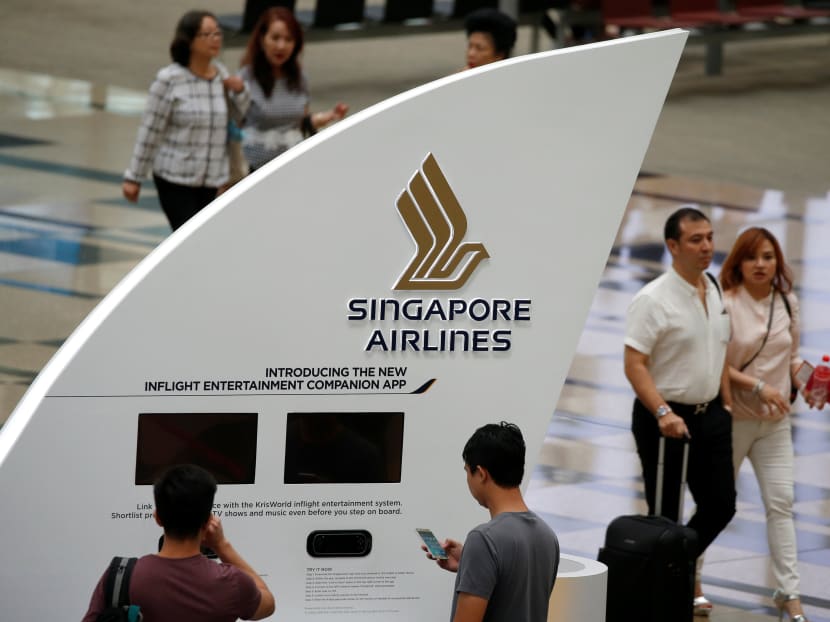Singapore Air warns of tougher days after 181% profit jump
SINGAPORE — Asia’s marquee airlines are warning tougher competition is squeezing them.

People pass a Singapore Airlines signage at Changi Airport in Singapore May 11, 2016. Photo: Reuters
SINGAPORE — Asia’s marquee airlines are warning tougher competition is squeezing them.
Singapore Airlines Ltd said on Thursday (July 28) passenger yields — a key measure of profitability in the industry — remain under pressure amid “aggressive capacity injection”. Yields declined to their lowest in more than six years in the first quarter. The stock fell 1.6 per cent at the start of trading in Singapore on Friday.
Earlier this month, Mr Ivan Chu, chief executive officer of Cathay Pacific Airways Ltd, which dominates the Hong Kong financial hub, said there is “intense pressure” on the metric.
The expansion of the Middle East’s ‘Big Three’ — Emirates, Etihad Airways and Qatar Airways — and an unprecedented surge by budget airlines in the region is hurting the pricing power of Asian carriers. Singapore Air CEO Goh Choon Phong and his Cathay counterpart Mr Chu have ordered some US$20 billion (S$27 billion) in new aircraft to modernise their fleet and take on their competitors who are offering luxuries like on-board shower and butlers.
“Yields will continue to erode for many quarters to come,” said Mr Shukor Yusof, founder of aviation consulting firm Endau Analytics in Malaysia. “We are still in the downside of the cycle, especially for the premium sector. There is still some overcapacity in the market.”
Shares of Singapore Air dropped 1.6 per cent to S$11.02 as of 9am in Singapore trading, while the city’s Straits Times Index fell 1.1 per cent.
Singapore Air — the only Asian airline to have flown the Concorde and first in the world to fly the A380 superjumbo — on Thursday reported first-quarter profit almost tripled as lower oil prices reduced costs and the company benefited from the sale of a stake by its subsidiary. Net income jumped to S$256.6 million ($190 million) in the three months ended in June even as sales declined 2.1 per cent to S$3.6 billion.
Yields, or the revenue earned from a passenger for flying a kilometre, was 10.3 Singapore cents in the quarter ended in June, compared with 10.7 Singapore cents in the same quarter a year earlier.
“The business outlook for the parent airline company remains challenging amid economic weakness and geopolitical concerns in some markets,” Singapore Air said in the statement. “Competition remains intense with aggressive capacity injection, and yields will continue to remain under pressure. Yields will be further diluted if key revenue-generating currencies depreciate against the Singapore dollar.”
Cathay Pacific, which is due to detail first-half earnings next month, is projected to report a net income of HK$5.13 billion (S$890 million) for the year, according to the average estimate of 17 analysts compiled by Bloomberg. Last year, the carrier had a net profit of HK$6 billion.
Singapore Air’s first-quarter numbers benefited from an increase in passenger numbers as economic growth from China to Southeast Asia to India allowed more people to travel for work and leisure.CEO Goh took over low-fare subsidiary Tiger Airways to integrate with long-haul budget airline Scoot.
Singapore Air carried 4.63 million passengers at its main airline in the fiscal first quarter, 1.3 per cent more than the 4.57 million a year earlier. It filled 75.8 per cent of seats, compared with 76.3 per cent a year earlier.
A more than 50 per cent decline in oil prices in the past two years has helped reduce costs for most airlines, whose single biggest expense is fuel.
INDIA, AUSTRALIA
Singapore Air needs new passengers to stem a slide in earnings. The carrier is counting on cabin comforts to lure higher-end passengers used to its fully flat beds as well as more price-conscious customers.
The carrier has been looking to build alliances abroad as part of a multi-hub strategy. It partnered with India’s Tata Group to start Vistara in January 2015 and owns about 23 per cent of Virgin Australia Holdings Ltd. The company’s Scoot unit also teamed up with Nok Airlines Pcl of Thailand to set up NokScoot.
Singapore Air started flying its Airbus Group SE 253-seat A350 aircraft to Amsterdam from May 9. The carrier will receive the ultra-long-range version of the plane in 2018 for services to New York, which will become the world’s longest non-stop flight. BLOOMBERG









